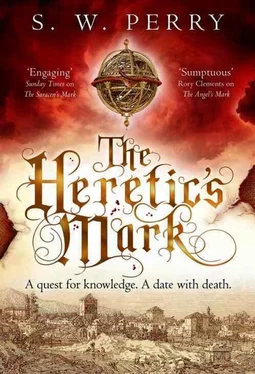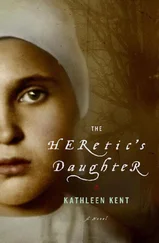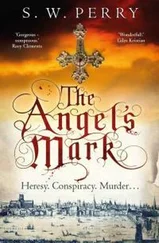She settles quietly in a pew near the altar rail and tries to calm her racing mind. She imagines she must glow with guilt, visible to all around. Yet no one pays her attention. The roof does not fall in upon her. The flagstones do not crack and gape beneath her feet. God does not whisper even the softest condemnation to her. In the end, she thinks He must understand that she is no murderess, but simply someone trying to protect her husband from a threat she cannot quite put shape to. And more than that, even – protecting the child growing inside her.
Eventually a peace she hasn’t felt for weeks comes over Bianca. She rises, genuflects, crosses herself and walks back to where Nicholas is waiting. As they leave the Basilica, she takes his hand. ‘Whatever happens, Nicholas,’ she says, ‘I did not bring you back from your darkness only to let another have you.’
He is about to ask her what she means when they notice, simultaneously, a small band of citizens gathered in the mist by Donatello’s statue. A woman’s voice reaches them, throaty and insistent.
Hella Maas is standing with her back to the plinth, her face transfused with righteous vehemence, her words laden with warning. The small crowd stares at her in appalled wonder.
Before Nicholas can stop her, Bianca lets go of his hand and pushes her way forward. He follows, fearing what she might do. The crowd parts for them. In an instant Bianca is within striking distance of the maid. Startled by the sudden movement, Hella glances at her. Her eyes widen in recognition, but her voice does not falter.
Bianca stops for a moment. Nicholas reaches out to grab her sleeve, to restrain her. But then she steps forward again, not aggressively, but calmly, until she is close enough to the maid to embrace her.
Hella stops her ranting. She lowers her arms and regards Bianca with a quizzical expression. Bianca leans in close and says something Nicholas cannot hear. He knows it cannot be a threat, because Bianca’s body remains loose and calm. There is no anger in the way she holds herself.
Hella bows her head in thought. Then she replies – in Italian, and too softly for Nicholas to catch. Bianca turns, walks back to him, takes his hand once more and leads him out of the Piazza del Santo.
‘What did you say to her?’ he asks.
‘What does it matter? I have already forgotten her,’ she replies. ‘What was the phrase you used? As if she had never existed .’

Bianca’s new gown has arrived in the nick of time. She takes one look at the pearl-coloured brocade with red lace trimmings and proclaims it the most exquisite thing she has ever seen. Nicholas thinks he has never seen her looking more beautiful.
‘I wish Rose were here to see it,’ she says, after thanking Bruno so profusely that he has begun to blush.
‘I insist on paying you,’ Nicholas says, drawing him aside. ‘This is too generous to stand, even for you.’
Bruno pats his arm. ‘I told you before: it is my way of thanking you both for saving my life when I came to London. If you want, you can pay for the panels when they’re needed.’
‘The panels?’
Bruno’s hands spread outwards from his doublet, in imitation of a swollen belly.
‘Oh, yes, I see what you mean: when she’s… larger .’
‘Exactly,’ says Bruno.

The mist still clings to the city like a spurned lover. The sun has not been seen all day. Those citizens who have listened to the warnings given by the strange maid in the Piazza del Santo go about the streets with troubled faces, wondering if her predictions are coming to pass even sooner than she had claimed. Their mood does not improve when word spreads that the hour-hand of the great clock on the face of the Torre dell’Orologio has stopped moving.
It’s just nesting birds, gumming up the mechanism with straw and mud, the Podestà’s men announce. We’ll have it fixed in time for the horse race. But their assurances find little purchase with those who prefer a more supernatural explanation.
In the race stables, the favourite stallion suddenly rears without warning. Panicked, its flailing hooves break the skull of the groom’s thirteen-year-old assistant. The groom lays the blame on a rat seen running across the cobbles. Highly strung stallions are prone to such terrors, he tells the owner – who has him soundly flogged for trying to spook the horse on behalf of a competitor in the hope that it might injure itself. But by the time the news is common knowledge, another explanation is already in play: the mount reared in terror when an eagle – the colour of the darkest night – alighted upon the rail of its stall.
The wise men at the university on the Palazzo Bo laugh at these stories. The common people do not. Italians, Bianca reminds Nicholas as they walk to the Piazza dei Signori to watch the start of the race, often have superstition running in their veins more thickly than blood. But it doesn’t make them stupid.
The piazza itself is too packed for Bianca’s liking, so they find a place in a nearby street where there is still room to stand in relative safety, their backs to the stucco houses. The make-up of the crowd has Nicholas imagining that the entire population of Padua has been poured into a bucket, stirred with a ladle and decanted into the streets. Gallants in satin doublets and striped hose rub shoulders with artisans in broadcloth; women in vibrant gowns stand beside friars in brown sackcloth; children shelter between the steel knee-guards of men-at-arms, glancing up at them with wary fascination.
The Podestà’s men have proved to be overconfident. The hour-hand of the clock on the Torre dell’Orologio is still jammed. But the bell in the tower works. As it begins to toll, the Podestà drops his official baton. In the side-street where Nicholas and Bianca are standing, heads turn expectantly towards the great roar coming from the Piazza dei Signori. Bianca clings tightly to Nicholas’s arm.
And then the ground seems to sing, as though an invisible tide is beginning to flow over the cobbles. Bianca senses the people around her holding their collective breath. From the direction of the piazza comes a noise that she can only liken to barrels of ale rolling down the ramp to the Jackdaw’s brewhouse. Faint at first, it swiftly rises to a frightening roar.
At the end of the side-street where it gives onto the Piazza dei Signori, a tight phalanx of horses bursts out of the mist. Heads tossing, jaws grinding on iron bits, nostrils gaping, spume flying, they plunge forward like creatures fleeing out of hell. Their jockeys ride bareback, stirrupless. Clad in vibrantly coloured silk tunics, they crouch low over the necks of their mounts, gripping the reins with one hand, lashing furiously with a leather crop held in the other. For Nicholas, it is impossible to distinguish the crowd’s shrieks of terror from its screams of encouragement. He has the brief impression of a dark wall of rippling muscle bearing down upon him, then a roar like a mountain falling into a wild ocean.
And then they are gone. Almost as one, the crowd lining the street turns to watch them go. Catching his breath, Nicholas says, ‘I’ve never seen the like. It was terrifying.’
‘I don’t like the way they whip the horses,’ Bianca confesses. ‘And you wouldn’t want to be a bull in Italy.’
He looks at her quizzically. ‘A bull? The Paduans race bulls, too?’
‘No, Husband,’ she replies, grinning. ‘The whips . If you’re a bull, they cut off your pizzle, dry it out in the sun, stretch it and make a lash out of it.’
Читать дальше













